It’s been over four years since the City of Portland first announced their interest in bike-sharing. They’ve held off for a number of reasons; but new developments show that the plan could come to fruition sooner than you might think.
A panel discussion on the topic at the Oregon Active Transportation Summit last month revealed that the idea to bring a large-scale bike-sharing system to Portland is once again gaining steam.
Bike-sharing in Portland has at least some amount of all the essential ingredients required to pull it off: a potential funding source (for start-up costs), interest from the private sector (for operating costs), influential supporters, and support from City of Portland staff and Mayor Sam Adams.
“A couple [health care companies] have shown real interest in potentially sponsoring them [the bikes].”
— Steve Gutmann, Portland Sustainability Institute
As we reported back in January, the current concept being worked on by the City of Portland is to create a bike-share system in the Central City (on both sides of the river, see map below). The biggest hurdle right now is start-up funding, which PBOT estimates at about $4 million (based on Portland’s proposed 750 bike/74 kiosk system).
Portland’s best chance at snagging a significant portion of that start-up money is a pot of Federal Flexible Funds that will be handed out by Metro. The Central City bike share project is expected to compete well for those funds, but it’s far from a slam dunk.
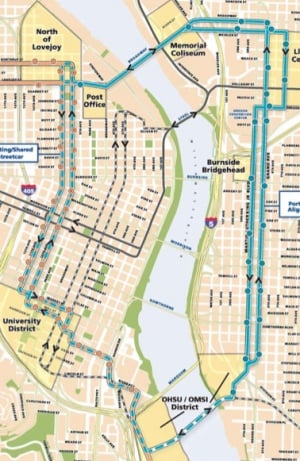
While PBOT touts that the Central City Bike Share project will lead to thousands of new bike trips and give 35-50,000 Portland residents (40% of which are low-income) access to free/cheap transportation, members of the Portland Bike Advisory Committee are weighing that project against active transportation investments in East Portland.
Dan Bower, who works for the City of Portland’s Transportation Options Division (where the bike-sharing project resides), told us that, “A lot hinges on those flexible funds.” Bower acknowledges those funds aren’t a sure thing, but he said his team has put the project, “On a path to yes.” Given that PBOT Director Tom Miller and Portland Mayor Sam Adams are both supportive of the idea, Bower says he has “given them a recipe” for the project to come to fruition.
Assuming that PBOT wins the $4 million flexible funds for start-up costs, Steve Gutmann, a bike-share expert and Finance Innovation Director at the Portland Sustainability Institute, told attendees at the Oregon Active Transportation Summit last month that Portland’s system would cost about $750,000 per year to operate (based on $2,000 per bike per year and assuming half of that is recouped through user fees).
How will that operations expense be funded? A public-private partnership seems likely.
Gutmann says that he’s already approached major health care companies in the region including Legacy Emanuel, ODS, and others. “A couple have shown real interest in potentially sponsoring them [the rental bikes],” he said at the summit last month.
I’ve been an advocate for a public-private partnership… There’s a potential for some real private connections.”
— Rick Gustafson, Director of Operations, Portland Streetcar Inc.
Along with Gutmann, other local transportation insiders who are actively working for bike-share in Portland are Rob Sadowsky, leader of the Bicycle Transportation Alliance and Rick Gustafson, who has a long history in regional politics and transportation circles and is currently the Director of Operations for the Portland Streetcar project.
Gustafson, a former senior planner for TriMet, is an unabashed supporter of bike-sharing in Portland. “I regard it as a personal embarrassment for this region to not have a bike share program when other cities have done it,” he said, somewhat in jest, during a phone interview a few days ago.
Like Gutmann, Gustafson feels a private partnership is the way to make the project happen. “I’ve been an advocate for a public-private partnership… There’s a potential for some real private connections.”
To act as a buffer between city government and private companies, Gustafson feels a non-profit to operate and maintain Portland’s bike-share system — similar to Portland Streetcar Inc. — should emerge.
It’s hard to overstate the significance of Gustafson’s involvement in the bike-sharing equation. He’s widely respected when it comes to urban transportation and his role as a key figure in Portland’s streetcar renaissance make him an influential voice.
For his part, Mayor Adams (who oversees PBOT) says he hopes Portland will have a bike-share system by the end of this year. It was Adams who first pushed for the idea four years ago after he saw a bike-share system in action during a visit to Lyon, France.
Adams says he’s happy his staff and other experts have waited to make sure it’s the right thing for Portland, but he told me during an interview earlier this week that, “I think they’re right [to have waited], but I’ve been anxious to move it forward.”
As for funding the project, Adams knows that simply giving a corporation advertising space on the bikes and kiosks, isn’t politically viable. “I don’t want to trash Portland with that kind of advertising and I don’t think Portlanders would support that,” he said, “So, we’re coming up with some other ways to pay for it. These things don’t pay for themselves, but then again, every transportation mode is subsidized to a certain degree.”
Finding the money isn’t the only reason this project could pose a challenge for Adams. If it moves forward, advocates and community leaders from East Portland are likely to see it as just another example of how close-in residents are getting more attention while streets outside their homes are still without sidewalks and bike lanes.
— Stay tuned for more developments on this story. Read more about Portland’s long relationship with bike-sharing in our story archives.



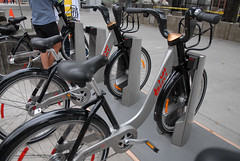

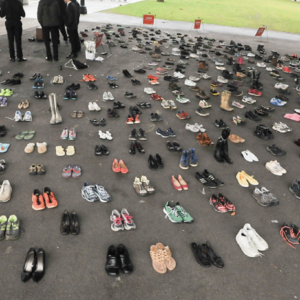
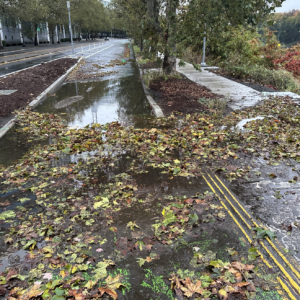
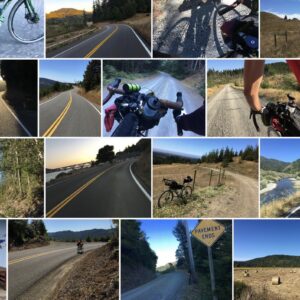
Thanks for reading.
BikePortland has served this community with independent community journalism since 2005. We rely on subscriptions from readers like you to survive. Your financial support is vital in keeping this valuable resource alive and well.
Please subscribe today to strengthen and expand our work.
Jonathan; Thanks for the article. To clarify; the Bureau is NOT seeking $4 million for Regional Flexible Funds. $4 million is our estimate for start-up and we’re working to cobble the funds together from multiple sources, Regional Flex Funds could be one piece of the puzzle.
Thanks,
Dan
Thanks for that clarification. I have edited the story to reflect that.
Does anyone think this will have a ground-breaking effect in Portland? I really don’t think this will change very much.
I’m a bit skeptical too but may have a skewed perspective. A basic but fully functional commuter bike is not particularly expensive to own and offers door to door service with virtually no added cost for each additional mile/minute of use.
It seems like the $4,000,000 could be better spent through a first-time-commuter-bike-buyer subsidy. That could get 10000 people a good new bike at potentially no cost.
There are a lot of potential bike commuters not willing to jump in with a new bike and gear (subsidized or not), due to various preconceived notions about bike commuting. But with bike share, some of these people will try it for a short trip, on whim, and be amazed at the ease, potential to save time, get exercise, enjoy the fresh air (& rain), etc.
That is just one benefit of bike share availability. Creating many more full-time or part-time bike commuters.
Could there be an impact from diverting tourism dollars away from the businesses that rent bikes for tours?
If a primary selling point is to provide cheap transportation access to low-income residents, why not a public-private partnership to promote bike ownership?
How do you get to 35,000-50,000 prospective users in the relatively small area currently designated, and are there data to support ridership estimates?
The equity issue isn’t insignificant given that the funds being eyed are regional.
A bike-sharing system is to owning your own bike like driving a car is to a using a great subway system.
Think of bike-sharing as a public transit system that provides free/cheap/easy access to a bicycle at any time. It’s much different than simply owning your own bike.
A few thoughts:
The strength of bike sharing is not in how the system operates on its own, but in how it relates to other available transportation options.
For example, right now if I go to TriMet’s trip planner I get step by step instructions for the fastest path between destinations on foot, by bus, or by MAX. Imagine bike share being a part of that mix. Now there’s the potential to replace walking and slower transit/streetcar connections with bike trips, simultaneously reducing trip times while effectively creating capacity on crowded transit vehicles.
Bike sharing also extends the reach of transit by providing first- and last-mile solutions. Moreover, a bike share system makes biking a convenient and time-competitive mode in hilly terrain. For example, if you work at the top of a hill you might take transit every day to avoid biking up the hill, but having a bike share station at the top of the hill means you could easily bike the return trip home.
Now imagine that the bike sharing system you use in Portland interfaces seamlessly with light rail, bus service, and Zipcar. Oh, and your membership also affords you use of bike share systems in other cities, too. Not a bad setup if you have to travel a lot for work.
Basically, I think bike sharing systems might force us to step back and reconsider a bit how we’ve traditionally thought about trip-chaining and combining different modes to provide universal solutions. And such.
Here’s an idea: What if an annual or monthly Tri-Met bus pass could gain someone access to the bike sharing network? A synergy of multi-modal travel.
You might be surprised to hear that this sort of thing is actually being discussed. I’ve got a story about this in the hopper. Stay tuned.
I’d love a bike sharing program — there are a lot of trips I do where one leg of the trip could be via a bicycle, particularly from one end of downtown to the other. Hopefully if a program starts, they will allow one way trips…
Color me unconvinced that this will take off in Portland. However, I’d love to be proven wrong.
I’m skeptical, especially when east Portland is not involved. Prove me wrong if you can.
bike sharing in this city will be explosive, especially if done with the usual Portland pizaaz and with the big picture understanding how it fits into the entire Trimet/Streetcar.
I would love the option to make a bus/max transfer to bike, especially it it were free for the first 30 minutes and I could drop it off at a kiosk near my next destination (think: grocery stores, transit centers, shopping centers, schools, churches).
Bike sharing is for moments where you don’t have your bike, or maybe you don’t usually bring it with you when you’re accessing transit. Those in-between uses will be the most important for real meat of the model.. visitors who access the system for joyriding will be the gravy. Remember the reach of the system is limited, and usually the bikes have no locks, so it’s really a point-to-point system. Regular cycle commuters will still opt to bring their own ride, borrow from a friend, or rent from one of our quality local bike rental shops.
someday, I’d love to see an edit button on BikePortland 🙂
i hear you steve. At this point, I am the edit button 😉
cool, so you know, when you have time, please edit all my comments for proper grammar and sentence flow. much easier than editing myself, thanks!
Yes – I would love to edit my mistaken comments
I think your correct in saying the meat will be visitors. I think other bike share programs are recording 40% of the users are people buying one day passes (visitors from out of the region or perhaps suburbanites). I would be a little disappointed if it was constrained to the limits of the map above as it would compete with other forms of transportation that are being built in that area all ready (light rail and street car). The Washington DC (Capital Bike Share program) has stations spread over 15 miles as I understand it.
I’d prioritize adding more car-free and safe bike paths throughout the city if I had budget control.
…but an open bike sharing system could add new bikers into the fold.
Anyway, better to have it then not have it.
Will helmets be required?
Just based on the sample rides I took on some of the models from the bike-share demo in Waterfront Park last year, I can’t say I’m terribly enthusiastic. Those bikes are heavy, not at all fun to ride if you’re used to a half-way decent urban/commuting/hybrid type bike. Maybe people who don’t ride much will find them useful; personally, I’d rather walk (which is usually what I do anyway — lock my bike somewhere central and cover various errand stops on foot, then ride back home). I’d much rather see Portland do something more home-grown and flexible, similar to what Evan Ross was proposing the last time this topic came up.
It’s funny how Adams goes to Lyon and sees bike-share, yet somehow fails to miss the relatively low rate homelessness. (The entire country of France has about as many homeless as the city of Los Angeles.) I guess you see what you want to see and miss what you want to miss.
Yeah, but the population of France is only about 6x the population of LA (64 M to 10 M). So their rate of homeless is about 1/6 that of LA — certainly a major improvement, but a long way from no homeless people. In addition, I wonder if the warm weather in LA means that that part of the country has a relatively high (for the US) proportion of homeless people.
Just returned from my second trip to Paris where the Velibe system has bikes stationed every 300 meters. The system makes a lot of sense, is easy to use and practical. You want or need to get somewhere is a hurry, grab a bike and go. Pretty stupid for us not to have a like system.
I think the real audience for a Central City bikeshare program to be car, bus and MAX commuters, downtown residents who live in apartments that don’t have convenient, ground-level bike storage, and tourists.
A Central City bikeshare system would basically be used by everyone BUT people who are already commuting by bike every day. By giving everyone else access to shared bikes when they’re in the City, my hope is that bikesharing will get these former non-cyclists to begin to self-identify as bicycle riders, and support (or at least become less opposed to) expanding bike infrastructure. Some of them may become commuters, but most probably won’t.
So what? There are some people who will never commute by bike. That doesn’t mean they shouldn’t ever ride a bike, and this system gives them a chance to do so whenever they come downtown.
Tulsa has had this for years now, and Portland has had it before. Let’s hope this time around it’s a bit more Tulsa Townies and a bit less Yellow Bikes.
Look like the BiXi .The bixi is the sharing bike system we got here in Montréal